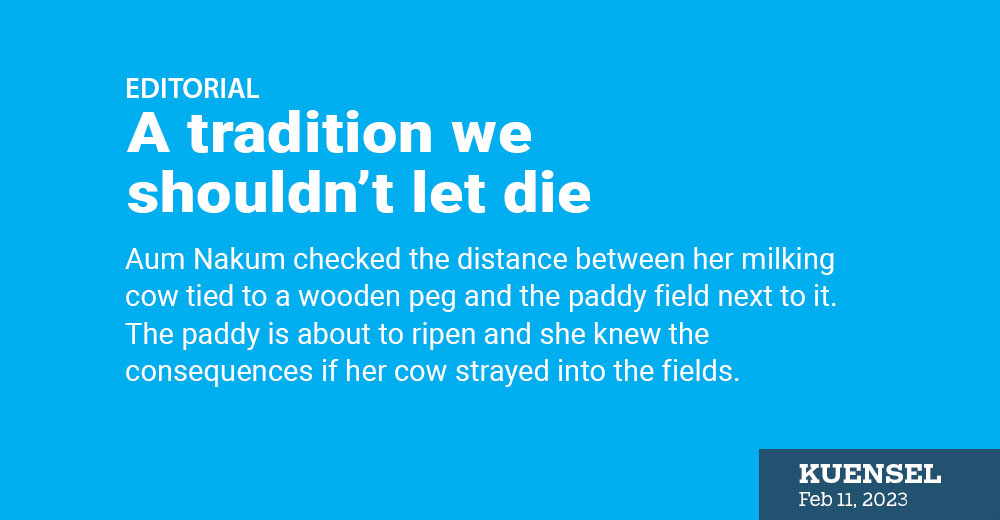Aum Nakum checked the distance between her milking cow tied to a wooden peg and the paddy field next to it. The paddy is about to ripen and she knew the consequences if her cow strayed into the fields. The rope snapped unfortunately, and Nakum’s cow foraged and trampled a good part of the field. The owner berated her and they got into an argument. But without the intervention of the neighbour, the two villagers could have made the matter worse with the owner threatening to kill the cow and Nakum challenging her to do so.
When things cooled down, the village’s former gup intervened and amicably solved the issue. Nakum was asked to pay what they call thokey or crop compensation – a rough estimate of the paddy damaged by the straying cow. Left on their own, the matter could have worsened as abuses were flying even digging into their past to the amusement of fellow villagers.
It was a nangdrig, both parties agreed to as they respected the Gupdrep (former gup).
The good tradition of nangkha nangdrig or mediation at the village or community level had played a vital role in harmonious existence, particularly in rural Bhutan. While reports show that thousands of such cases were settled internally in the northern dzongkhags, it is a tradition popular all over the country. It is indeed a practice that has been in place before the arm of the formal judiciary system reached the nook and corners of the country. It is still common today and with the intervention of the Bhutan National Legal Institute (BNLI), it is gaining popularity.
Going by the records of the institute, 3,454 such disputes were resolved amicably in just one year in 2002. It is an immense burden lifted from the judiciary. Aum Nakum and her neighbour’s case may be considered a miscellaneous case in the dispute category, but records with the institute show that cases of inheritance, matrimonial and even land are settled through this process by village elders or a respected figure (go-sheb nen-sheb) in the community.
If it is an age-old tradition, it does not deviate from the formal justice system. In a nangkha nangdrig case, there are no losers or winners. And it is not against the law as we know it today. In fact, our laws are largely based on our systems, tradition, culture and derived from our religion and the vast teachings of the Buddha that we recite everyday. An offence committed under the influence, for instance, stealing neighbour’s rooster, could be forgiven or settled with some compensation. Even today, it is not uncommon to see our law enforcers offer settling a case internally whether it is an extramarital or vehicle accident case.
Nangdrig is not only among villagers. A lot of cases even among the educated or office-going people are resolved through this practice of mediation. They include complex cases like matrimonial and even criminal cases like theft and battery.
Not burdening the courts is an added benefit when our courts are overwhelmed with cases these days. The tradition saves money and time. Villagers know how long it takes to settle a case. Some even threaten each other of giving them enough time to “bask in the sun outside the court” – a phrase used to mean wasting time waiting outside the courts.
The beauty of nangkha nangdrig is that they could always resort to the formal court system if parties are not sticking to the settlement. The agreements and those involved in the case provide solid evidence or witnesses.


